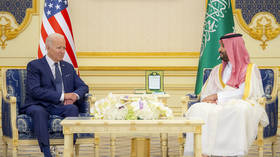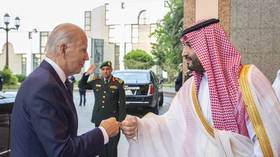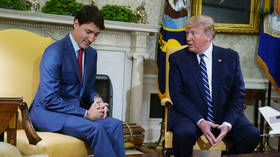Saudi-US relations deteriorate over oil, but the issue is much deeper

US President Joe Biden has threatened “consequences” over Riyadh’s decision to cut oil production, a move that resulted in embarrassment for the Democratic Party leader. The defiant move from Saudi Arabia, however, may be much more complex than meets the eye.
Washington has been up in arms ever since the Kingdom of Saudi Arabia, a long-time US partner in the Middle East, pushed for oil production to be slashed at an OPEC+ meeting earlier this October. The consequences were immediately evident – as Biden heads his party into the November midterm elections, oil prices will not drop, which hurts his hopes of defeating the Republicans at the polls. Prominent Democrats began launching tirades against the Kingdom, outraged that the Saudis’ move could affect the election results.
The decision of OPEC+ earlier this month to cut production to a low not seen since 2020 was instantly characterized by Washington as Saudi Arabia taking the side of Russia over the West. To make things worse for Biden, Riyadh has reportedly expressed interest in joining the BRICS economic alliance, currently composed of South Africa, Brazil, Russia, India, and China.
Saudi Arabia has denied that it made any decisions in order to side with Russia, saying it was especially “astonished” over claims that it was taking a stance against Ukraine.
Although the Saudi decision to cut production is undoubtedly a blow to the West, especially as Europe continues to suffer energy shortages, the move was not likely meant as a political stance on the conflict between Russia and NATO-backed Ukraine. If anything, the message can be interpreted as an anti-Democratic Party stance, rather than anti-American.
Although the rhetoric has shifted in Washington to reflect the original position of the Biden administration when it took office, now focusing on human rights violations and the autocratic nature of the Saudi state, the real reason for this is not genuine concern. Biden was even reported to have asked the Saudi government for a concession so that the oil production cut would not go into effect until after the election, according to Riyadh. But with attempts to postpone the OPEC+ decision proving futile, the US president is now forced to address the issue of oil prices in order to salvage votes his party risks losing over the issue ahead of November 8.
The Republican Party is clearly favorable to the Saudis’ own regional agenda, with former President Donald Trump making the Kingdom the destination of his first foreign trip in office. Trump, who still holds significant sway over the Republican Party, was a great ally of both the Saudis and the United Arab Emirates when in office. Through lobbying efforts and other forms of pressure on the Republican Party, Riyadh and Abu Dhabi seemed content with the results they received. Notably, Thomas Barrack, who served as an unofficial Trump administration adviser, has been accused of being a foreign agent for the Emirati government over his role in influencing the former president on major foreign policy issues, and may have greatly reshaped the approach that Saudi Arabia and the UAE have taken for their own regional power.
Then there is the hypocritical approach of the Biden administration. The US president claimed, in his first address on his administration’s foreign policy agenda, that he was going to hold Riyadh to account for its human rights violations and work to bring the war in Yemen to an end. Biden stated that offensive weapons and other relevant arms sales to Saudi Arabia would be canceled, yet approved weapon sales later that same year.
Come 2022, the war in Yemen is far from over and Biden ended up traveling to Saudi Arabia in order to repair US-Saudi ties. The July trip included a sit-in at an Arab Summit meeting, where the president vowed to not “walk away” from the Middle East. This was coupled with word of Washington readying itself to reconsider sales of offensive weapons to Saudi Arabia once again, despite the trip not resulting in any tangible benefits for the US global and/or regional agendas. In fact, around a week prior to the latest OPEC+ oil production cut, Saudi-US relations had hit a new high point as reports emerged of the encouragement of US investors to go to Saudi Arabia; this came after the Kingdom had been involved in a Russia-Ukraine prisoner exchange deal.
In response to calls from prominent Democrats to cut ties, Adel al-Jubeir, the Saudi foreign minister, listed off the following elements that bind US-Saudi relations, in an interview with CNN:
“We have almost 80,000 Americans living and working inside Saudi Arabia. We have a very strong trade and investment relationship. We work very closely in regards to ensuring our common interests, whether it is to bring peace to Yemen, whether it’s to bring peace between Israelis and Arabs, whether it’s to stabilize Afghanistan, whether it’s to reintegrate Iraq into the Arab fold, whether it’s to bring stability to the horn of Africa, whether it’s to bring stability and peace in Libya and the G5 countries of the Sahel, whether it’s to fight extremism and terrorism. Those interests are permanent and those interests are tremendous.”
The reason this statement is notable is its clear demonstration of the power that the US can harness through its relationship with Riyadh. The two sides have been joined at the hip since the discovery of oil in 1938, with this relationship greatly improving following the fall of the Shah of Iran in 1979. However, Saudi Arabia has not sat back and allowed the US to simply take advantage of it, buying up major parts of the US oil market itself and ensuring that its impact on regional affairs has cemented its role as a primary regional player, not just an international gas station.
While Saudi Arabia’s human rights violations, committed domestically and abroad, are abhorrent, the Biden administration clearly is not interested in them. This is why US-Saudi relations have deteriorated only now, when oil prices and partisan electoral issues are at stake, representing yet another embarrassment for the White House. During Biden’s visit to Saudi Arabia, the president reportedly attempted to bring up the murder of Washington Post journalist Jamal Khashoggi. As the Saudi account goes, Crown Prince Mohammed bin Salman countered Biden by pointing to the Israeli killing of Palestinian-American journalist Shireen Abu Akleh and the torture of detainees at Abu Ghraib prison in Iraq by US forces – the message being: Don’t pretend to be something you are not. US-Saudi relations are here to stay, short of Washington attempting to fuel another regime change war, a move that would prove catastrophic for US interests.
The statements, views and opinions expressed in this column are solely those of the author and do not necessarily represent those of RT.
















